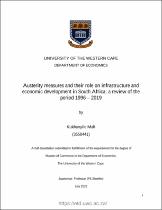Austerity measures and their role on infrastructure and economic development in South Africa: A review of the period 1996 – 2019
| dc.contributor.advisor | Sheefeni, Johannes | |
| dc.contributor.author | Mali, Kukhanyile | |
| dc.date.accessioned | 2022-10-31T07:45:03Z | |
| dc.date.available | 2022-10-31T07:45:03Z | |
| dc.date.issued | 2022 | |
| dc.identifier.uri | http://hdl.handle.net/11394/9397 | |
| dc.description | Magister Commercii - MCom | en_US |
| dc.description.abstract | The global economy is a complex system. Due to globalization, the South African economy has become interconnected and integrated into the global economic system. Thus, it is a complex system influenced by domestic and international activities. South Africa is also a country that has been troubled with many challenges in the past. It is a nation that emerged from apartheid, a discriminatory Afrikaner system that legislated the discrimination, disinvestments, and exploitation of blacks, mainly Africans, by whites in all spheres of society (Christie and Collins, 1982). Despite the democratic breakthrough that was achieved by the ANC and its allies through struggle and negotiations, South Africa still faced a triple threat of unemployment, poverty, and inequality along racial lines. | en_US |
| dc.language.iso | en | en_US |
| dc.publisher | University of the Western Cape | en_US |
| dc.subject | Austerity | en_US |
| dc.subject | Economic development | en_US |
| dc.subject | Fiscal policy | en_US |
| dc.subject | Neoliberalism | en_US |
| dc.subject | South Africa | en_US |
| dc.title | Austerity measures and their role on infrastructure and economic development in South Africa: A review of the period 1996 – 2019 | en_US |
| dc.rights.holder | University of the Western Cape | en_US |

